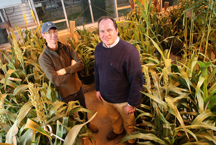Purdue gets $1 million to improve sorghum research tools
February 5, 2013
 |
|
Mitch Tuinstra and collaborators are working to identify
sorghum genes that play a role in yield, resistance to Striga and other
beneficial characteristics. (Purdue Agricultural Communication photo/Tom
Campbell)
|
WEST LAFAYETTE, Ind. - Three Purdue University scientists will use a $1 million grant to develop genomic tools needed to improve sorghum, an important African food crop.
The researchers will use the support of the Bill & Melinda Gates Foundation to identify sorghum gene functions, especially those that play a role in crop yield, protein and starch digestion, and resistance to Striga, a parasitic weed that attacks sorghum's root system.
"We have a sorghum genome, but we don't have all the tools necessary to see what each of the genes do," said Mitch Tuinstra, the project's principal investigator and a Purdue professor and Wichersham Chair of Agronomy. "Sorghum doesn't receive a lot of research investment, but it is a vitally important crop throughout Africa."
 |
|
Cliff Weil |
Tuinstra will work with Purdue's Cliff Weil, a professor of agronomy, and Brian Dilkes, an assistant professor of horticulture, to analyze a collection of mutants they have created in the sorghum variety that has had its genome sequenced. They can then determine which genes are responsible for the physical attributes displayed by the mutant plants. Once genes and traits are matched, they can be used to design plants with desired characteristics.
"The work of these College of Agriculture researchers embodies our commitment to research with purpose leading to discovery with impact," said Jay Akridge, the Glenn W. Sample Dean of the College of Agriculture. "This research to better understand the sorghum genome has the potential to make important contributions in efforts to feed the world's growing population."
 |
|
Brian Dilkes |
The Purdue team will work with the West Africa Center for Crop Improvement in Ghana to teach students plant-breeding techniques using genomics and bioinformatics, a high-tech method for analyzing biological data. They'll also partner with the Striga Research Unit in Burkina Faso to test new technology in Striga-infested fields.
"Purdue is truly in the first rank of scientific advances against world hunger, and we are deeply proud of Dr. Tuinstra and his colleagues for this latest contribution to that all-important cause," Purdue President Mitch Daniels said.
The Bill & Melinda Gates Foundation funding will cover the project's first three years.
Writer: Brian Wallheimer, 765-496-2050, bwallhei@purdue.edu
Sources: Mitch Tuinstra, 765-494-5895, drmitch@purdue.edu
Jay Akridge, 765-494-8391, akridge@purdue.edu
Mitch Daniels, president@purdue.edu
Ag Communications: (765) 494-2722;
Keith Robinson, robins89@purdue.edu
Agriculture News Page

